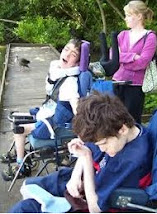Council for Exceptional Children (CEC)
Early Bird Deadline is fast approaching
The CEC 2012 Convention & Expo, is April 11-14 in Denver -- have you registered yet? The clock is ticking: Register by Jan. 17 to save up to $100 off onsite registration with the Early Bird Discount.
The CEC 2012 Convention & Expo, is April 11-14 in Denver -- have you registered yet? The clock is ticking: Register by Jan. 17 to save up to $100 off onsite registration with the Early Bird Discount.
Time for your free Tool of the Week: How Would I Feel? Worksheet
CEC's Tool of the Week is a free resource from CEC's first-rate publications that you can use NOW.Subscribe to Tool of the Week and you'll find a free tool in your inbox every Monday morning.
CEC's Tool of the Week is a free resource from CEC's first-rate publications that you can use NOW.Subscribe to Tool of the Week and you'll find a free tool in your inbox every Monday morning.
CEC Member, NCSER head Speece on special education research agenda
Deborah Speece, new Commissioner of the National Center for Special Education Research (NCSER), talkswith CEC Today about the agenda for special education research and the importance of remaining faithful to the research in the classroom.
Deborah Speece, new Commissioner of the National Center for Special Education Research (NCSER), talkswith CEC Today about the agenda for special education research and the importance of remaining faithful to the research in the classroom.
CEC's Perspective on NCLB after 10 years
The No Child Left Behind (NCLB) Act is turning 10 this year. CEC was honored to be featured in Education Week's compilation of essays by education thought leaders sharing their perspectives on what the controversial law has meant to students, educators, and families.
The No Child Left Behind (NCLB) Act is turning 10 this year. CEC was honored to be featured in Education Week's compilation of essays by education thought leaders sharing their perspectives on what the controversial law has meant to students, educators, and families.
Reality 101: Anticipation of the future
Richard shares his concerns about moving his students to the Common Core State Standards.
Richard shares his concerns about moving his students to the Common Core State Standards.
Sir Ken Robinson to Keynote CEC's 2012 Convention & Expo
Sir Ken Robinson, an internationally recognized leader in the development of education, creativity, and innovation, and author of the New York Timesbestselling book The Element: How Finding Your Passion Changes Everything, will be keynote speaker at CEC's Convention & Expo.
Sir Ken Robinson, an internationally recognized leader in the development of education, creativity, and innovation, and author of the New York Timesbestselling book The Element: How Finding Your Passion Changes Everything, will be keynote speaker at CEC's Convention & Expo.
CEC approves of Senate bill limiting restraint, seclusion
Sen. Tom Harkin has introduced the “Keeping All Students Safe Act,” to ensure students will “never be subjected to abusive or violent disciplinary strategies or [be] left alone and unsupervised.” The bill will set long-overdue standards to protect children from physical and psychological harm and ensure a safe learning environment for teachers and students alike.
Read CEC’s comments in Education Week
Read CEC’s policy on restraint & seclusion
Sen. Tom Harkin has introduced the “Keeping All Students Safe Act,” to ensure students will “never be subjected to abusive or violent disciplinary strategies or [be] left alone and unsupervised.” The bill will set long-overdue standards to protect children from physical and psychological harm and ensure a safe learning environment for teachers and students alike.
Read CEC’s comments in Education Week
Read CEC’s policy on restraint & seclusion
CEC shares concerns about research budget with Ed Week
Senior director for Policy and Advocacy Lindsay Jones calls funding for NCSER the "engine for innovation," for special education and worries it will face further cuts.
Senior director for Policy and Advocacy Lindsay Jones calls funding for NCSER the "engine for innovation," for special education and worries it will face further cuts.
Urge Congress to Restore Funding for Special Education ResearchWhile everyone has been forced to cut back, some changes have been more drastic than others. One area of real concern for the field of special education is research funding, which took a disproportionate hit in 2011 and must be restored. The fight isn't over - join us today! Send a message to Congress, telling them to restore funding for special education research now.
Meet CEC's new Board of Directors
The votes have been tallied and here are the results! Meet our new board members, chosen from a field of extremely well qualified candidates who all displayed a deep commitment to the future of CEC and special education.
The votes have been tallied and here are the results! Meet our new board members, chosen from a field of extremely well qualified candidates who all displayed a deep commitment to the future of CEC and special education.
Ignoring the needs of disadvantaged students
A front-page Washington Post piece highlights the lack of diversity among the country's academic elite. CEC's response to the piece outlines the nation-wide implications for ignoring such talent and points out a key proposal that is lying dormant in Congress that would right this wrong.
Read CEC's response to the Post piece
Read the Washington Post pieceRead more about the Talent Act
A front-page Washington Post piece highlights the lack of diversity among the country's academic elite. CEC's response to the piece outlines the nation-wide implications for ignoring such talent and points out a key proposal that is lying dormant in Congress that would right this wrong.
Read CEC's response to the Post piece
Read the Washington Post pieceRead more about the Talent Act
Registration and Housing Now Open for the CEC 2012 Convention & Expo
CEC and the CEC 2012 Convention Program Chair, Dr. Douglas Cheney, invite you to join us for the premier professional development event dedicated to special and gifted education: the CEC 2012 Convention & Expo, April 11-14 in Denver. Learn more and register now.
CEC and the CEC 2012 Convention Program Chair, Dr. Douglas Cheney, invite you to join us for the premier professional development event dedicated to special and gifted education: the CEC 2012 Convention & Expo, April 11-14 in Denver. Learn more and register now.
CEC Seeks New Assistant Executive Director for Professional Development Services
The Assistant Executive Director for Professional Development Services, under the general direction of the Executive Director, is responsible for the leadership, direction and day-to-day management of all professional development service matters for the Council for Exceptional Children. View the full job description and requirements.
The Assistant Executive Director for Professional Development Services, under the general direction of the Executive Director, is responsible for the leadership, direction and day-to-day management of all professional development service matters for the Council for Exceptional Children. View the full job description and requirements.
NCLB/ESEA Reauthorization Underway
Watch this space for information and updates on the reauthorization NCLB/ESEA, as well as opportunities to lend your voice to the process. More details are always available on CEC's Policy Insider Blog.
Watch this space for information and updates on the reauthorization NCLB/ESEA, as well as opportunities to lend your voice to the process. More details are always available on CEC's Policy Insider Blog.
Source: cec.sped.org





